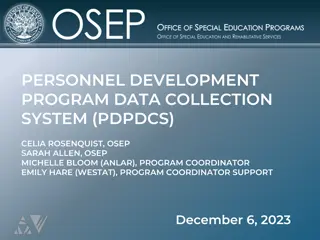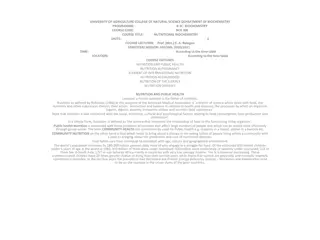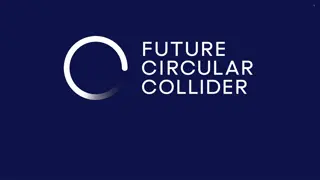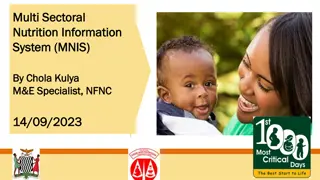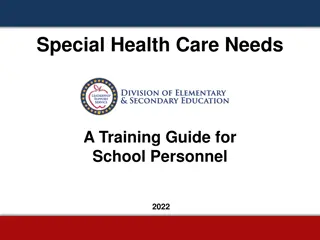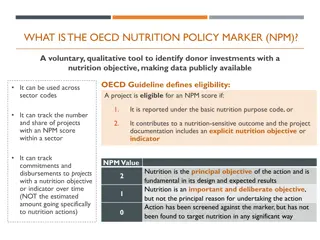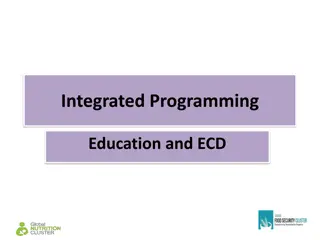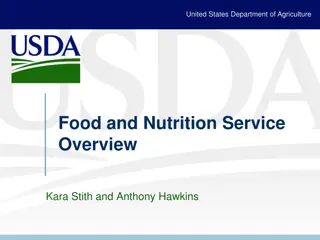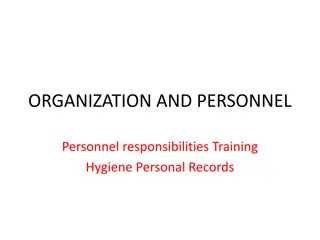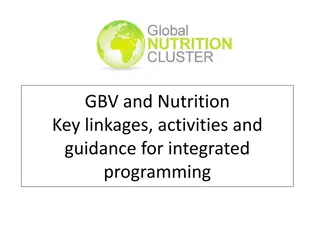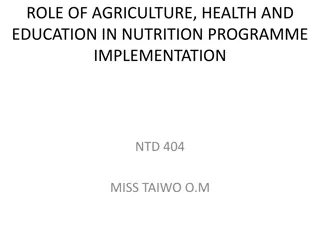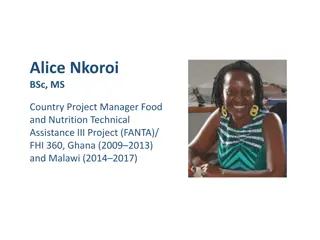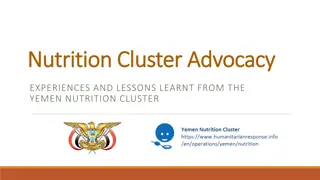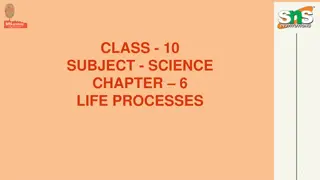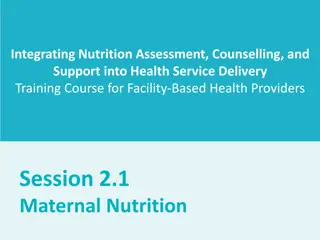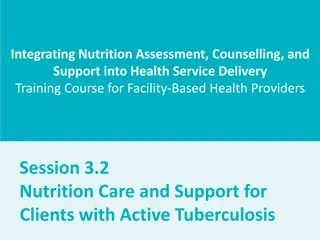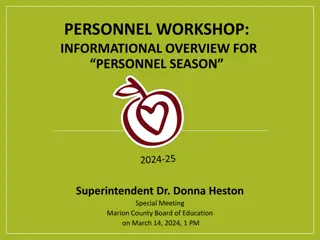School Nutrition Personnel Training Guidelines Overview
Guidelines for professional standards, unpaid meal charge policy, and recordkeeping in the School Nutrition Programs (SNP), including USDA hiring standards for SNP directors, annual training requirements, and flexibilities for small SFAs. Details on hiring standards, student enrollment criteria, food safety training requirements, and the importance of meeting hiring standards with HCNP approval.
Download Presentation

Please find below an Image/Link to download the presentation.
The content on the website is provided AS IS for your information and personal use only. It may not be sold, licensed, or shared on other websites without obtaining consent from the author.If you encounter any issues during the download, it is possible that the publisher has removed the file from their server.
You are allowed to download the files provided on this website for personal or commercial use, subject to the condition that they are used lawfully. All files are the property of their respective owners.
The content on the website is provided AS IS for your information and personal use only. It may not be sold, licensed, or shared on other websites without obtaining consent from the author.
E N D
Presentation Transcript
Professional Standards, Unpaid Meal Charge Policy, Recordkeeping June 2019
Purpose To ensure school nutrition personnel in NSLP and SBP have the knowledge and skills to manage & operate the programs correctly and successfully Maintain Program Integrity
USDA Final Rule Established: Minimum hiring standards for new directors Annual continuing education/training requirements for all school nutrition personnel
March 1, 2019 Final Rule Flexibilities Does NOT affect annual training hours for all school nutrition staff More flexibility for small SFAs that have challenges in meeting hiring standards 4 total flexibilities
Hiring Standards: SNP Directors
SNP Directors: Hiring Standards Hired AFTER JULY 1, 2015: Education Experience Food Safety Training (if any) Before July 1, 2015 - grandfathered
SNP Directors: Hiring Standards Student enrollment: 2,499 or less Student enrollment: 2,500-9,999 Student enrollment: 10,000 or more Refer to Professional Standards for All School Nutrition Program Employees flyer for details.
SNP Directors: Hiring Standards Minimum Prior Training Standards (required) At least 8 hours of food safety training is required either not more than 5 years prior to their starting date or completed within 30 calendar days of employee s start date.
Remember, if you are an SFA who is hiring a new director, but he/she does not meet the hiring standards, you will need approval from HCNP BEFORE hiring that individual.
Annual Training Requirements SY 2016-17 & Beyond 12 hours Directors* Managers 10 hours All Other Staff 6 hours Part-Time Staff (less than 20 hrs/wk) 4 hours *This required training is in addition to the food safety training required in the first year of employment.
Operations Areas of Training Nutrition Administration Communications/ Marketing
Maintain Hiring Documentation To demonstrate compliance with hiring standards Documentation that may be reviewed: College transcripts Education information Resumes for new hires Food safety training
Maintain Training Documentation Demonstrate compliance with the annual training requirements Supporting documentation: Training agenda Sign-in sheets Certification of Completion
Features Ability to upload training completion certificates One employee (e.g. Director) may create profiles for their staff Summary report (Think: Administrative Reviews!) Requires a Level 1 USDA eAuthentication account (same as the online Food Buying Guide)
Training Log - Sample Template Completed Training - Year to i.e. Director/Manager/Staff SY Training Applied To Training Title/Subject Employee First Name Employee Last Name Length of Training Employee Position: (creditable time) Training Date(s) Required Hours Hiring Date Date
Resources USDA Tracker Tool 2.0 https://pstrainingtracker.fns.usda.gov/ https://www.youtube.com/watch?v=r0h8nNWu61E Info https://www.fns.usda.gov/tn/guide-professional-standards-school-nutrition- programs Q & A s SP 38-2016: http://www.fns.usda.gov/sites/ default/ files/cn/SP38-2016os.pdf Training Resources: Database http://professionalstandards.fns.usda.gov/ Food Safety Training https://theicn.org/icn-resources-a-z/food-safety-in-schools
Purpose To address situations where children participating at the reduced or paid rate do not have money to cover the meal cost at the time of meal service
SP 29 - 2017 Overcoming the Unpaid Meal Challenge No later than July 1, 2017: All SFAs operating NSLP and/or SBP must have a written unpaid meal charge policy.
SP 46-2016: Unpaid Meal Charges: Local Meal Charge Policies Required: All SFAs operating standard counting & claiming SFAs operating an exclusive Special Provision are exempt SFAs must maintain documentation of communication Both the policy and method of communication will be assessed by HCNP during Administrative Review (AR) State Agencies and SFAs have discretion in developing specifics of the policies
UMCP - Requirements Children who qualify for free meals can NEVER be denied a meal Include policies regarding collection of delinquent debt Focus on households/parents Communicated to families are start of each school year Transfer students Provide policy to school staff, particularly: POS staff Social workers & liaisons Office staff
S.B. No. 423 Signed into law on July 12, 2017 No student shall be denied a meal solely for failure to pay: Within the first thirty days of the first semester of a school year while the student s application for free or reduced lunch is being processed Within one week following student s meal fund account reaching a zero or negative balance
SP 47-2016: Unpaid Meal Charges: Clarification on Collection of Delinquent Meal Payments Unpaid charges considered delinquent debt when payment overdue as defined by policy Delinquent debt: debt that is considered collectable and efforts are made to do so USDA does not regulate how long debt considered delinquent SFA efforts to collect delinquent debt are an allowable use of funds
Delinquent Debt vs Bad Debt Delinquent debt unpaid meal charges for which payment is overdue (defined by the local policy) versus Bad debt debts which have been determined to be uncollectable
Recordkeeping Bad Debt Evidence of efforts to collect unpaid meal charges Including evidence that those efforts followed timeframe and methods est. by school policy Documentation showing when unpaid meal charges were reclassified as bad Evidence that funds classified as bad have been restored using other funds
Date of Eligibility USDA has permitted flexibilities for the date a student may receive benefits SP 11 -2014: flexibility for retroactive reimbursement for meals served to student(s) while processing application
Purpose Ensure Program Integrity & Transparency Administrative Reviews Complaints Potential Audits Investigations
Time Requirement The USDA requires sponsors to maintain records for 3 years plus the current year For SY 2019-20: must have records on file from SY 2016-17 Longer if being audited
D.O.E. Time Requirement The Hawaii Department of Education requires records to be kept for 6 years plus the current year
Special Provision Schools Schools participating in CEP, Provision 1, 2, or 3 must maintain base year (year one) records for duration of provision participation
Which Forms? Examples of forms/documents to keep on file: F&R Price Applications Enrollment & Student Eligibility Status (including CEP information) Production Records, Menus Meal Counting Records Edit Checks Staff Training Logs Outreach Documentation If unsure: KEEP ON FILE!
Making Corrections & Adding Information DO NOT use white out on official documents Applications, meal counting records, production records, edit checks, etc. Make line through the error, write change/correction, initial & date If adding information: initial, date, provide explanation if necessary
Non-Discrimination Statement In accordance with Federal civil rights law and U.S. Department of Agriculture (USDA) civil rights regulations and policies, the USDA, its Agencies, offices, and employees, and institutions participating in or administering USDA programs are prohibited from discriminating based on race, color, national origin, sex, religious creed, disability, age, political beliefs, or reprisal or retaliation for prior civil rights activity in any program or activity conducted or funded by USDA. Persons with disabilities who require alternative means of communication for program information (e.g. Braille, large print, audiotape, American Sign Language, etc.), should contact the Agency (State or local) where they applied for benefits. Individuals who are deaf, hard of hearing or have speech disabilities may contact USDA through the Federal Relay Service at (800) 877-8339. Additionally, program information may be made available in languages other than English. To file a program complaint of discrimination, complete the USDA Program Discrimination Complaint Form, (AD-3027) found online at: http://www.ascr.usda.gov/complaint_filing_cust.html, and at any USDA office, or write a letter addressed to USDA and provide in the letter all of the information requested in the form. To request a copy of the complaint form, call (866) 632-9992. Submit your completed form or letter to USDA by: (1) mail: U.S. Department of Agriculture Office of the Assistant Secretary for Civil Rights 1400 Independence Avenue, SW Washington, D.C. 20250-9410; (2) fax: (202) 690-7442; or (3) email: program.intake@usda.gov national origin, sex, age, and disability. USDA Child Nutrition Programs recognize the following protected classes: race, color, This institution is an equal opportunity provider.






